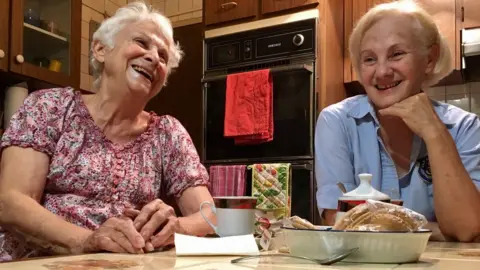Venezuela crisis: Retirements ruined and families pulled apart
 BBC
BBCIsabel Dubuc is a youthful 87 years old. She's a petite woman but has a big smile and an even bigger voice.
She launches into song, performing 'Te Quiero, Dijiste' by Mexican musician Maria Grever with gusto.
Her face lights up when she's given a round of applause. It's not often she gets a chance to sing. She used to be in a choir but doesn't feel safe going out now.
"Every day we are more and more like prisoners," she says.
With the economic crisis, crime has soared. Caracas is now considered one of the most dangerous cities in the world.
'We don't go anywhere'
While the government has stopped publishing crime statistics, the Venezuelan Violence Observatory put the number of violent deaths in the country in 2016 at 28,479. That's 92 per 100,000 people.
Big highways that in other capitals would be buzzing at 8pm or 9pm are deserted. Street lighting is intermittent.
People finish work and want to get home.
"We don't go anywhere," says Caris, the eldest of Isabel's four children. Both the main door downstairs and their own front door to their apartment have security bars as protection.
"We only go out to shop, to go to the doctor or to go to work, but there's nothing fun to do," she says.
"Those times we'd meet people for dinner or lunch, go out and celebrate - they don't exist anymore, they're over," adds Isabel.
Savings have vanished
Caris is 66 years old. For 31 years, she worked as an air-traffic controller. She retired a decade ago but realised she had to keep earning money. She studied to become an English teacher and now she works 52 hours a week.
Even with a pension, the money didn't stretch. She enjoys teaching but it's not the retirement she had hoped for.
With annual inflation in Venezuela expected to rise to 2,300% next year, her savings have vanished.
She dreamed of travelling the world and using her English. There's little chance of that now. Even travelling to see family abroad has become prohibitively expensive.
Two of Caris's children have gone to live in Argentina and Chile. She has one son here in Venezuela who lives at home.
Caris's siblings also live abroad - the last one left just a few months ago. They are in the UK and the US.
"Thankfully, my children and grandchildren have managed to leave and that's great for them," says Isabel, smiling. "I'm glad they've gone because they have a better quality of life than they can have here."
But she doubts any of them will return.
She has to make do with phone calls and photos. On both sides of her bed are picture frames showing her children at weddings and family occasions that she talks about fondly.
"Not even during the dictatorship of Perez Jimenez have we seen a situation like we have today," Isabel says, referring to Venezuela's dictator who ruled between 1952 and 1958.
"We used to have everything - a united family, that has slowly disintegrated."
'Our retirement has collapsed'
One of Caris's biggest worries is about what would happen if she were to fall ill. She's her mother's main carer.
"It terrifies me," says Caris.
But they're not thinking about that for now. In Venezuela, the day-to-day is what matters. Plus trying hard not to think of what could have been.
"I never thought my old age would be like this. Never," Isabel tells me "I saw my parents retirement. Their old age was quiet, with their family around them, they never had to change their way of life.
"But ours has collapsed."
